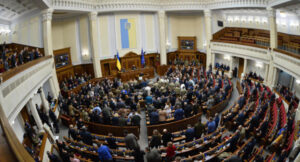
Starting April 1, 2024, according to the Law “On the State Budget of Ukraine for 2024”, the minimum wage in Ukraine will increase to UAH 8 thousand. This will change the amount of certain employment-related payments, the amount of which is aligned with the minimum wage.
In particular, the maximum amount of compensation to employers will increase.
Thus, the amount of compensation for the employment of citizens who have been registered as unemployed for more than 1 month (people with disabilities, combatants and those who have no more than 5 years left before the right to an old-age pension) will now amount to UAH 8 thousand (1 minimum wage).
Compensation for the employment of young people among the registered unemployed (under 25 years of age – with less than 12 months of insurance experience; under 35 years of age – for the first job; discharged from military / alternative service – for the first job) will increase to UAH 4 thousand (50 percent of the minimum wage).
The compensation for employment of citizens who have been registered as unemployed for more than 1 month and have additional employment guarantees or have been registered for more than 6 months will increase to UAH 3,520 (double the minimum insurance premium, which is 22 percent of the minimum wage).
Compensation for the employment of internally displaced persons during martial law will amount to UAH 8 thousand (1 minimum wage) starting from April 1, 2024. At the same time, the compensation of employer’s expenses for labor remuneration of IDPs hired by the employment centers will increase to UAH 16 thousand (2 minimum wages).
The amount of partial unemployment benefits per employee or individual entrepreneur will also increase to UAH 4 thousand (50% of the minimum wage).
The maximum amount of remuneration for participation in public works will also increase and from April 1 will amount to UAH 12 thousand per month (1.5 times the minimum wage).
For reference: Since the beginning of 2024, 295 employers in the capital have used the compensation programs of the Kyiv SLC and received payments in the amount of over UAH 7 million.
compensation to employers, LAW, minimum wage, State Budget of Ukraine, WAGES

The Verkhovna Rada has amended the Criminal and Criminal Procedure Codes of Ukraine to criminalize smuggling of goods and excisable goods, which is one of the conditions for the last tranche of the EU’s EUR 1.5 billion macro-financial assistance to Ukraine.
According to MP Yaroslav Zheleznyak (Holos faction), the committee’s version of the draft law was adopted, which was amended in accordance with the letters from the Ministry of Finance that the business insisted on.
“1) It is proposed to raise the thresholds for smuggling 5 times. 2) The thresholds for excisable goods are to be raised by 2 times. 3) The entry into force (criminalization) of commodity smuggling is postponed until mid-2024. As I said, this is the deadline under the (memorandum with the) IMF on the BES reboot,” the MP listed the changes.
He added that the numerous wishes of the business community have also been taken into account, and that actions can only be classified as a crime if there is intent.
“Possible cases of prosecution under ‘smuggling’ articles for submitting documents with false information have been significantly limited – in the amended version, they must be the basis for the movement of goods, be subject to mandatory declaration under customs law, and have an impact on determining the amount of customs payments or compliance with non-tariff regulation measures,” Zheleznyak said.
During the voting, no amendments were made to the text submitted by the committee to the Rada for the second reading, but the text itself is not yet available on the parliament’s website.
According to the representative of the relevant committee, Oleksandr Bakumov (Servant of the People), the threshold for criminal liability for smuggling is set at UAH 6.71 million, which is 50 times higher than in the draft law adopted as a basis (UAH 113.5 thousand – IF-U). He added that the threshold for smuggling excisable goods (except for electricity) has been increased by “thirty-three and three and a half times” compared to the original draft (UAH 56.75 thousand).
Members of the European Solidarity and Batkivshchyna parties, who criticized the draft law, called the main problems of the law the presence of law enforcement agencies in the customs control zone with the addition of the Bureau of Economic Security (BES) and the unresolved problems that led to the adoption of the law on smuggling decriminalization in 2011.
“Ukraine is the only country in Europe and in the World Customs Organization whose customs authorities are not vested with pre-trial investigation functions… We could have left only what is transported outside the customs posts to be considered smuggling,” says MP Nina Yuzhanina (European Union). According to the current legislation, only the illegal transportation of cultural property, poisonous, potent, explosive substances, radioactive materials, weapons or ammunition, parts of firearms, as well as special technical means of covertly obtaining information is considered smuggling.

President of Ukraine Volodymyr Zelenskyy has signed the law on the state budget for 2024.
According to the card of the relevant draft law No. 10000 posted on the website of the Verkhovna Rada, the document was returned to the parliament with the signature of the head of state on November 28.
As reported, on November 9, the Verkhovna Rada adopted as a whole the draft law No. 10000 on the state budget for 2024.

The law on raising the bank profit tax from 18% to 50% in 2023 and to 25% in the following years was adopted without discussions with banks, it is discriminatory and has long-term negative consequences for the investment and business climate in Ukraine, said Oleksandr Pysaruk, Chairman of the Board of Raiffeisen Bank (Kyiv).
“Excessive profits of banks cannot be determined based on the results of one year. Retrospective taxation of excessive profits for 2023, as well as an increase in bank profit taxes in the future, is unreasonable and discourages bank shareholders from investing in this business,” the head of Ukraine’s largest bank with foreign capital said in an interview with Interfax-Ukraine.
Pysaruk emphasized that he supports the need to temporarily raise the bank profit tax in the current circumstances and has publicly stated this. According to him, the version of the law approved in the first reading to increase the tax to 36% for 2024-2025 was discussed with banks and was fair.
According to the banker, the retroactive taxation approved without discussion at the end of the year creates a very dangerous precedent and tax uncertainty for all economic agents, especially for foreign investors. “Retrospective is bad in itself, but when retrospective is linked to 50% instead of the existing 18%, it is a shock,” he added.
Commenting on the 50% rate, Pysaruk explained it as a desire to collect an additional 0.3% of GDP from banks as part of the revision of the program with the IMF, when state-owned banks are already paying large dividends.
“In fact, the payers of this record-high tax are private banks, of which the largest tax burden falls on banks with foreign capital. And the retrospective taxation is compounded by disproportionate and discriminatory treatment of private shareholders of the banking system,” the banker stated.
He noted that the problem is also the unfair singling out of banks from the rest of the economy in terms of raising their income tax to 25% on a permanent basis in the coming years.
“Why are they the only ones to receive the tax increase? Why 25% and why permanently? Why not 28%, 22%, or 20%? … This is an example for investors and business in general: if you are transparent, you will be taxed even more. And at the same time, you leave a bunch of economy that does not pay taxes or pays little,” Pysaruk said.
In his opinion, the tax on banks starting in 2024 should have been discussed as part of the preparation of the National Revenue Strategy prescribed in the program with the IMF, which the Ministry of Finance is obliged to present by the end of this year and which declares the expansion of the tax base.
The head of Raiffeisen Bank also emphasized that banks are a cyclical business, and its profitability should be assessed over a fairly long period of time, on average 7-10 years. According to him, in the period from 2013 to 2023, the total return on equity of Ukrainian banks (excluding PrivatBank and its nationalization) was 69%, i.e. approximately 6% per annum in hryvnia, while the cost of capital in any year after 2013 exceeded 20% per annum.
“That is, the last ten years have been unprofitable for bank shareholders. The situation is much worse for foreign shareholders of Ukrainian banks who calculate their total income in euros. Over the past ten years, the banking system has suffered a total loss of 52%, approximately -8% per annum in euros,” Pysaruk said.
He explained this by the large losses of Ukrainian banks in 2014-2016, the almost fourfold devaluation of the national currency and the inability to receive dividends for several years.
“Today, the banking business in Ukraine is unprofitable. The cost of capital is very high due to high inflation and very high risks in the country. And I’m not even talking about the war,” stated the Chairman of the Board of Raiffeisen Bank.
In his opinion, the adopted law will discourage strategic banking investors from participating in the privatization of state-owned banks, which is necessary given their high market share.
“We may be left with a banking system with an excessive share of state-owned banks for a very long time,” Pysaruk said.
He added that this approach also does not stimulate foreign direct investment in other industries. “This is a very bad story for a country that needs external assistance both during the war and afterwards for development,” the banker said.
Commenting on the impact of the increased tax directly on Raiffeisen Bank, the Chairman of the Board said that in the short term there will be no significant impact, as the bank has excess capital and liquidity. “We will pass the NBU’s stress test without any problems and will continue to support our clients,” Pysaruk said.
At the same time, he believes that some other banks that are not as well capitalized may face problems.
“The National Bank will probably have to mitigate its plans to recapitalize banks, because it was the party that agreed to this decision. Because taxing banks in such a cruel, unfair way and then demanding capital is an additional horror story for investors,” the banker said.
He added that, combined with the NBU’s further increase in capital buffer requirements in line with EU standards, the higher corporate tax will reduce banks’ ability to generate capital to meet the increased demand for loans as Ukraine develops after the war.
Pysaruk also suggested that some banks may appeal to an international court because the adoption of such a law violates the provisions of intergovernmental agreements on investment protection, citing Spain as an example where banks challenged the windfall tax.
The Chairman of the Board of Raiffeisen Bank, who was formerly the First Deputy Governor of the National Bank of Ukraine and then worked for the IMF for three years, also expressed regret that the Fund had agreed to such a tax increase. According to Pysaruk, this is due to the program’s basic assumptions, which are under threat, of ending the war in mid-2024 and a certain level of international assistance.
“The IMF has to draw up a macroeconomic model and calculate the debtor’s ability… to repay the loan. And this tax was probably needed for such a model to be developed. But the price of the issue is exactly this: in order to save this program and continue it, laws are being introduced that reduce Ukraine’s already low investment attractiveness and may hinder plans to attract private foreign capital to rebuild Ukraine after the war,” the banker said.
According to the National Bank of Ukraine, as of October 1, 2023, Raiffeisen Bank ranked 4th in terms of assets (UAH 196.35 billion) among 63 banks operating in the country. Its net profit in January-September this year amounted to UAH 6.14 billion compared to UAH 2.39 billion in January-September last year.
In October 2005, the bank became part of the Austrian banking group Raiffeisen Bank International AG. Currently, Raiffeisen Group owns 68.21% of the bank’s shares, while the European Bank for Reconstruction and Development owns 30%.

Ukrainian President Volodymyr Zelensky signed the law No. 8401, canceling the 2% flat tax and bringing back documentary checks and PPO control, said the head of the specialized parliamentary committee Daniil Getmantsev.
“Bill 8401 has become a law. Use it,” he wrote in telegrams.
As reported, the Verkhovna Rada on June 30 adopted the law № 8401, one of the important structural beacons of the program with the IMF, on the abolition of the 2% single tax from August 1 and the return of documentary checks and PPO control.
Later, MPs from the inter-factional association “Reasonable Policy”, as well as the factions “Servant of the People” and “Batkivshchyna” registered three draft resolutions in the Verkhovna Rada to cancel the results of voting for this document in the second reading and as a whole, but they were rejected.

The Ukrainian League of Industrialists and Entrepreneurs supports sending the draft law No. 8087 “On Amendments to Certain Laws of Ukraine on Urgent Measures to Strengthen the Capabilities of Cyber Defense of State Information Resources and Critical Information Infrastructure”, which expands the powers of the State Service for Special Communications and Information Protection and obliges private companies to have a cybersecurity officer, for a second reading.
This was stated by Anatoliy Kinakh, President of the Ukrainian Union of Industrialists and Entrepreneurs, at a public discussion of the draft law held at the USPP.
“I would very much ask that following the results of our discussion, the proposal that has absolute support in the context of returning the draft law No. 8087 for a repeated second reading for significant revision be taken into account,” Kinakh said.
He emphasized that the shortcomings in the text of the draft law do not meet European standards, especially with regard to state control in this area, the inadmissibility of monopolization of such control functions, which entails, among other things, corruption risks.
“I am confident that today we have a list of suggestions and comments compiled at a serious professional and state level. I hope that today’s hearings will also be taken into account during the regulatory procedures in the Verkhovna Rada during further consideration of the draft law,” added Kinakh.
During the discussion, experts and management of the ULIE, in particular, Vice President Ivan Petukhov, expert Igor Dyadyura and member of the Kyiv Regional Bar Council Oleg Chornobay criticized the overly broad scope of the law, unlike European counterparts that affect only medium-sized businesses.
Draft law No. 8087 also applies to any actions related to the storage of personal data or other information with limited access in digital form, and thus, according to Chornobay, even an individual lawyer who maintains a client database and stores information subject to attorney-client privilege must hire a cybersecurity specialist (officer).
“There is a beautiful title to the draft law, but when we look at the specifics, we see that it introduces changes that affect not only state information resources and not only critical infrastructure facilities, but also the private sector. Thus, the purpose of the draft law is one, but its implementation is completely different,” added Chornobay.
Petukhov noted that even a small business that maintains a database of employees or customers may also be subject to the law and incur additional costs.
According to him, the rights of businesses to appeal against unlawful orders of government agencies are also being violated. If now they do not have to comply with it, if there is an administrative appeal of the decision, then according to the draft law No. 8087, this order must be fulfilled, and then, after the fact, it can be appealed.
Vitaliy Deynega, Deputy Minister of Defense of Ukraine for Digital Development, Digital Transformation and Digitalization, also criticized the bill.
“This law may prevent us from digitizing the army and deploying digital infrastructure in the context of hostilities,” he emphasized.
Deynega noted that the Ministry should retain its independence in determining the conditions and criteria for the supply of goods, works and services for the functioning of the armed forces’ information and communication systems.
As the agency reported, draft law No. 8087 was developed by a group of MPs led by Oleksandr Fediyenko.
On January 12, it was adopted in the first reading, and the relevant committee on national security, defense and intelligence recommends its approval in the second reading.